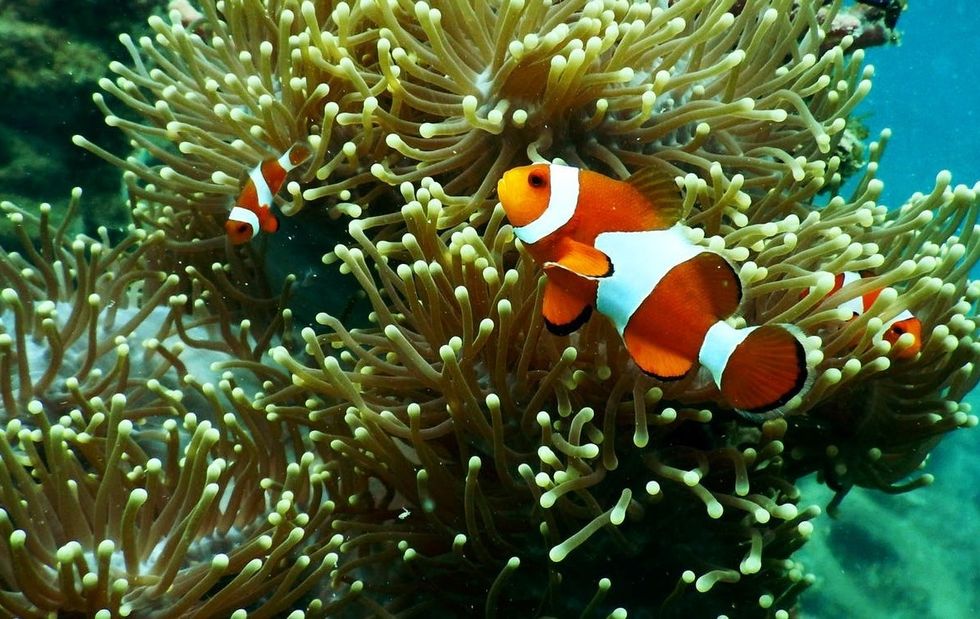While coral reefs protect and support marine ecosystems by helping with water filtration and marine life reproduction, the disregard for the death of reefs still exists.
Coral reefs sustain about a quarter of all marine life in our oceans and support almost one billion people across 101 countries. Coral reefs curb shoreline erosion, reduce the power of violent storms, and provide food and habitats for marine life that feeds people.
The annual value of goods and services provided by coral reefs is about $30 billion. The economic value of coral reefs from tourism and recreation is about $9.6 billion. A coral reef can yield 15 tonnes of seafood every year. And reefs can reduce wave energy by 97%.
But 75% of coral reefs are threatened by climate change and regional stresses.
The most well-known instance of coral reef destruction is seen in Australia's Great Barrier Reef. The reef experienced a coral bleaching event in 2016 and another in 2017. Ecologists have found that about 50% of the corals have died. At this rate, almost 90% of coral reefs will experience severe bleaching stress by 2040. And by 2100, the world may not have any functioning coral reef ecosystems.
Coral bleaching causes coral to look white and lifeless, unlike how colorful corals usually are.
Warm water temperatures caused by a mix of long-term climate change effects and short-term weather occurrences like El Niño can hurt corals. Along with ocean water temperature, water pollution and disease can also cause a coral to get rid of the algae that they have a symbiotic relationship with, which prompts bleaching. Heat makes corals more susceptible to viruses.
Plastics and trash can block sunlight from reaching corals and can also spread harmful bacteria. Overfishing is also an issue because it makes a food chain unbalanced. If there are not enough fish to control algae, the algae will grow wildly and crowd out coral. Most if not all of these issues are caused by humans and can be solved with more consideration for marine ecosystems.
While there may not be a solution to recovering the already bleached and dead corals, researchers can work towards sustaining what's left of the coral reefs in the world and possibly rebuilding the reefs. Some solutions include attempting to cool the oceans by pumping colder water from deeper parts of the ocean. Others are attempting to start selective breeding and genetic engineering to produce stronger corals.
Recently, researchers with the Great Barrier Reef Foundation have found that new coral colonies can be formed with a technique called larval reseeding which involves catching coral eggs and sperm during spawning to collect coral larvae before they deliver these developing corals to the reefs.
I'd propose more universities to encourage students who are pursuing coastal sciences, marine sciences, and other environmental sciences degrees and research to help with these restoration and conservation efforts. They could be offered research credit and for reefs that are not close by, schools can organize study abroad programs.
A drawback is that the research required extremely careful rearing of coral larval cultures and elaborate diving operations in the reef by the research team. But research teams always need all the help they can get so they can recruit student researchers and interns for less intense work like data collection.
If climate change won't stop for the coral reefs, then the coral reefs may have to build up strength for themselves, or at least with the help of environmental organizations. The Great Barrier Reef Foundation introduced the program Resilient Reefs to support World Heritage coral reef sites.
The World Heritage sites include some of the most iconic coral reefs like the New Caledonian Barrier Reef in the South Pacific, the Great Barrier Reef by Australia and Tubbataha Reefs Natural Park near the Philippines. Supporting these sites includes capacity building for local reef managers, funding strategies to support the reefs, and creating programs based on risk analysis and stakeholder agreement.
Another solution would be to protect the habitats, like islands, that surround reefs. Islands that are near the Great Barrier Reef, like Lady Elliot Island, have high biodiversity and should be conserved. An ecosystem rich in biodiversity provides many natural services such as contributing to climate stability, pollution breakdown, and absorption and protection of water resources.
Money has to be pulled in from somewhere and since a goal of the Environmental Protection Agency includes protecting human health and the environment, there would have to be more funding for the EPA. Earlier this year, the White House proposed to cut over $2.5 billion from the EPA's annual budget. This proposed cut would eliminate funding for radon-detection plans, water system improvements, and restoration of the Chesapeake Bay.
With the effects of climate change already having drastic consequences on humans, including rising sea levels wiping out homes, increase in vector-borne diseases, and poor air quality, I think the EPA needs to receive more funding from the US government to aid different environmental organizations and causes.









































